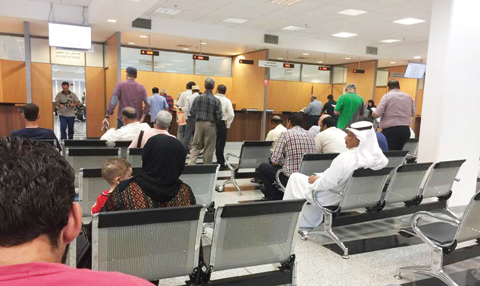MoI issues new residency bylaws - First convicted ex-MP returns to Kuwait
KUWAIT: Interior Minister Sheikh Khaled Al-Jarrah Al-Sabah yesterday issued new residency by-laws allowing visit visas to be transferred to residency visas in many cases. There were only minor changes to other residency rules and regulations, especially with regards to fees. The new regulations, which explain how the residency law should be implemented, became effective as of Monday after their publication in the official gazette Kuwait Al-Youm.
Visit visas may be transferred to residency visas for the following categories: Subject to the residency affairs' director's decision, visitors of ministries and public authorities (with government visit visas) holding university degrees; domestic helpers; dependents arriving on family or tourist visit visas; holders of valid residencies who do not exceed six months out of Kuwait and have to enter with a visit visa; those who enter for work and start procedures to get residency, but have to leave for a maximum of one month; cases subject to the residency affairs directorate's judgment.
Contrary to reports published repeatedly in the local press about plans to sharply raise almost all residency charges, the new rules included no major changes to residency fees, while dependent residency rules and others remain unchanged. The only change was introducing a KD 3 fee for obtaining a visa on arrival, which used to be offered free of charge for some nationalities. Residence and renewal fees remain at KD 10 per person per year.
Dependent residency fees for spouses and children remain at KD 10 per person annually, while the regulations allow the residency department to grant relatives other than the wife and children a dependent visa against a KD 200 charge yearly. This includes parents. The regulations set a minimum of KD 500 in monthly salary for those who can bring their families from abroad on dependent visas, while they give the director of the department to exempt couples already living here from the salary condition. The regulations also exempt a large number of professions from the salary conditions. These include judges, doctors, engineers, teachers, journalists and many others.
The new by-laws introduce a tourist visa allowing tourists to stay in Kuwait for up to three months, and a multiple entry visa valid for one year for just KD 1 for each month. Foreigners whose residence is cancelled and those who resign are given up to three months of temporary residency to leave.
In another development, former Islamist opposition MP Fahd Al-Khanna, who had been living abroad to avoid a three-year jail term, returned to the country yesterday after spending around one and a half years in Turkey. It was also reported that several other former opposition MPs and activists were returning to Kuwait after fleeing for the same reason.
The new development comes following reports that a general amnesty is expected to be issued to pardon the activists and dozens of other opposition members who are serving jail terms for either taking part in protests or writing tweets deemed offensive to HH the Amir.
Former opposition MP Ahmad Al-Shuraian said yesterday that a large number of nationalist figures have signed a memorandum addressed to HH the Amir Sheikh Sabah Al-Ahmad Al-Sabah, appealing to him to issue a general pardon for jailed opposition figures and others. He said that he has repeatedly approached officials of the Amiri Diwan to arrange to deliver the petition but his attempts have been unsuccessful. Accordingly, Shuraian said the petition will be published in order to reach the HH the Amir, adding that he is confident it will be in safe hands.
The former opposition figures were handed jail terms in the summer of last year, but they left the country before the verdicts were issued to avoid being jailed. Under Kuwaiti law, they will have to give themselves up to jail authorities as soon as they return. Their only solution is a pardon by HH the Amir or a general amnesty law by the National Assembly, which should be approved by the government.
By B Izzak










